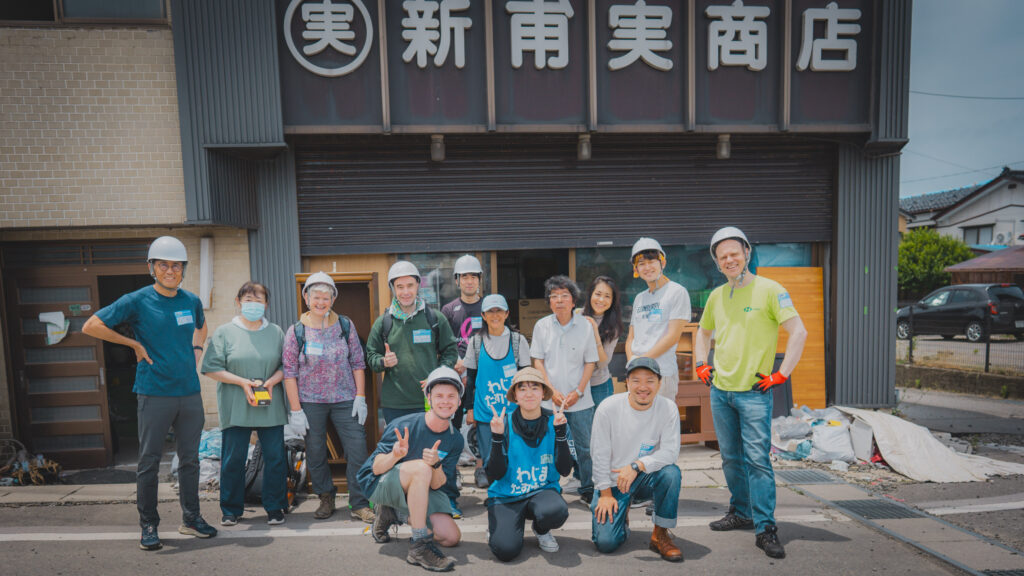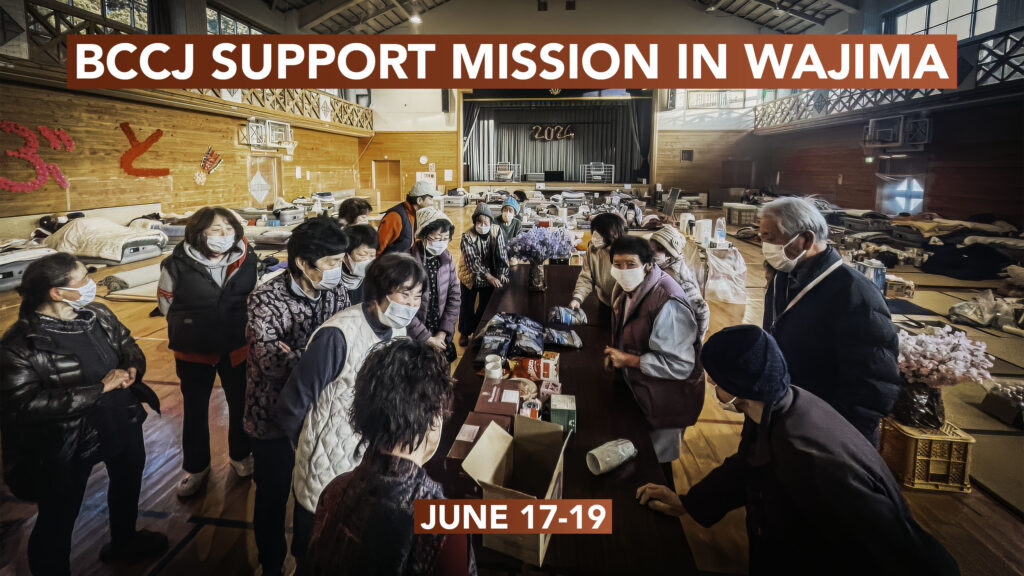Member? Please login
Reflections of Former BCCJ President David Bickle

Written by BCCJ
December 15, 2022
Community and Business, Member Spotlight
[This interview was conducted in April 2022]
Two years since receiving his OBE award in the 2021 New Year Honours (named in December 2020), David Bickle reflects on what the honour means to him and shares some of his key moments as BCCJ President, a role that he held from April 2014 to March 2022. In this special interview, he also considers what he has learned from the role, how the BCCJ has evolved and what he believes the future might hold for the BCCJ.
How do you feel about being appointed OBE for services to UK–Japan relations?
It’s a mix of emotions. I’m proud and honoured but also humbled, particularly when I think of others who received honours in 2021, many of whom had made life-saving contributions towards tackling the pandemic. I’m embarrassed to be singled out when I know that everything I have done at the BCCJ has been in collaboration with the marvellous office team and Excom [BCCJ Executive Committee]. The recognition I received is in large measure due to the opportunity I have had to work with them. And, lastly, I am very grateful; receiving the honour is a treasured personal milestone that has caused me to reflect profoundly on the support of the many people who have made sacrifices to help and encourage me on my way.
What prompted your nomination for BCCJ president?
I had been a member of the BCCJ since arriving in Tokyo in 2004 and really enjoyed the networking experience. That prompted me, in 2012, to stand for election to Excom. Our committee meeting in May this year marked exactly 10 years since I joined Excom, and it’s a great feeling that I’m still as enthusiastic—or probably more—to be involved.
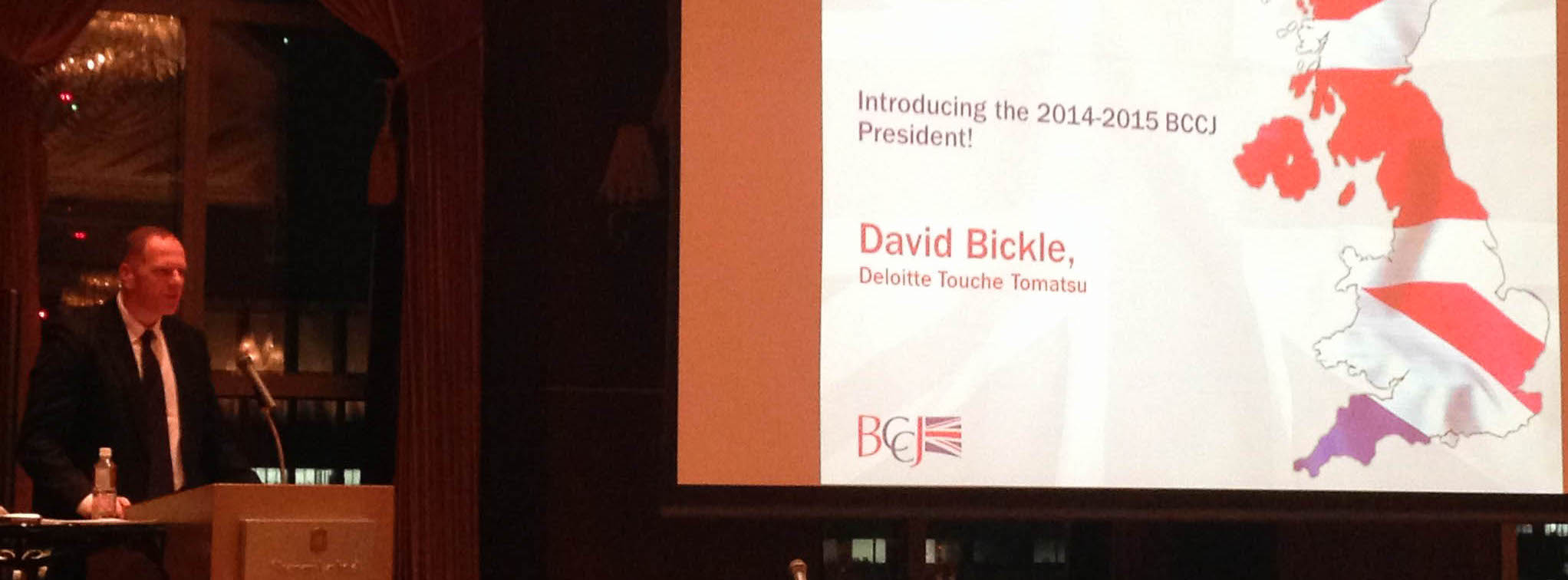
At the end of my second year on Excom, the role of president became vacant. I certainly didn’t feel worthy of the position and hesitated to put my name forward for election. In the end, though, I took the plunge, prompted by the fact that Japan has afforded me some incredible experiences: firstly, to work and play rugby in Kobe, to represent the Japanese national team, and then later to build a career in Tokyo. I’m proud to be a Brit and am very thankful to Japan. I wanted to make a contribution to the bilateral relationship and thought that by being president I might be able to do that.
What are your BCCJ highlights?
For me, the purpose of the chamber has always been that its members make great connections with people who matter. And during the past couple of years, I really feel that the BCCJ has been living that purpose.
We’ve had the vaccine accelerator programme, which served 1,250 BCCJ individuals, families and friends, and supported other chambers with their vaccine rollout. There were people with caring responsibilities for vulnerable family members who told us that early access to vaccines was literally life-changing—and I am so proud of our BCCJ office team for organising and delivering that initiative.
We also held Tohoku Week to mark the 10th anniversary of the Great East Japan Earthquake. This was a five-day campaign, featuring original media content each day, to showcase the recovery of different businesses and places. In addition, we celebrated Black History Month, a focal point in the UK for many years, which was great to bring to the BCCJ platform—a first step to being more vocal about the contributions of Black British people to the development of our countries.
Another highlight, pre-pandemic, was the BCCJ receiving APAC’s International Chamber of the Year Award in 2019: a great validation of the work of the chamber and its dedicated office team.

What events stand out?
My favourite event was a behind-the-scenes day organised by JR Central. We went to the Shinkansen driver training centre in Mishima, Shizuoka Prefecture, and had a tour of the operations centre at Tokyo Station. It was amazing to see the culture of JR, focused on safety and innovation, manifest itself from the top to the bottom of the organisation.
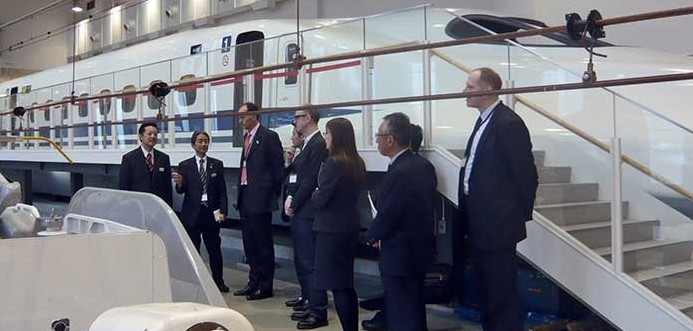
We’ve also hosted a stellar line up of VIP speakers: Tokyo Governor Yuriko Koike; Andrew Parsons, president of the International Paralympic Committee (speaking from Brazil); and a particular favourite of mine, Jeremy Hunt (then-Secretary of State for Health and Social Care) who once worked in Japan. There was also Michael Woodford MBE, former CEO of Olympus Corporation, and during the peak of COVID, Professor Andrew Pollard of The University of Oxford, who has since been knighted for his services to public health. Chief negotiator Graham Zebedee CMG provided updates on the UK–Japan Comprehensive Economic Partnership Agreement, and we were visited by Boris Johnson twice: as Mayor of London and as Foreign Secretary. Within the BCCJ family, we also heard many times from the legendary Haruno Yoshida, whose untimely passing in 2019 was a shock to many across our community. She was president of BT Japan, an Excom member and the first female executive on the Keidanren—a truly inspirational and energising character.
What has been most challenging?
COVID. In January 2020, Sarah Backley, executive director, had just joined the chamber team as maternity cover for Lori Henderson (then-executive director). Prepped to lead an organisation focused on delivering in-person events, Excom tasked her a couple of weeks later with taking everything virtual. Initially, we announced a two-week suspension of face-to-face events, and said we would be back soon. It was, in fact, more than two years before members met again in person.
Due to COVID, the BCCJ’s entire business model changed. We wanted to continue offering value for members and to maintain some sense of normalcy, but there was no playbook for running things virtually. We were blessed though to have tremendous input and support from members and I’m proud we were able very quickly to begin delivering events online. We were adamant that the British Business Awards (BBA) would go ahead, albeit in a new format. That’s because it has become so much more than a gala event; it’s a platform to amplify the stories, collaboration and successes of UK–Japan business, and that sense of mission has only become stronger since we had to take the ceremony online.
How has the BCCJ evolved?
Excom is more diverse and democratic, with leadership roles spread across members and task forces. When I first joined the committee, it was common for the wider BCCJ membership to hear only from the president at events (and that’s how it was too in my first few years at the helm!). We’ve now delegated roles, functions and leadership responsibility across Excom, which better leverages the tremendous breadth and depth of experience that the 15 members bring from their day jobs. It makes sense to harness that insight and capability.
We also established three conviction positions that we believe are at the heart of sustainable economic growth, and which became organisational pillars for chamber activity. These relate to the proliferation of responsible business practice, increased digital and technological innovation, and greater diversity and equity in more inclusive workplaces. Each Excom member is assigned to one of these pillars which cut across the traditional functional responsibilities for events, communications and membership. UK and Japanese companies have fantastic stories to tell around the pillar themes and, by bringing them together, the chamber enables dialogue, which fosters trust and the development of mutually beneficial business opportunities.
In terms of what the BCCJ delivers, I believe we’ve seen a big increase in “production quality.” In going digital, we rapidly evolved our tech capability (experienced by members through virtual event platforms) and for that we owe a debt of gratitude to Sam Maddicott, our digital whiz.
What’s it been like working with everyone?
That’s been the best part. I’ve been fortunate to work with three outstanding executive directors: Lori Henderson, Emma Hickinbotham (who covered Lori’s first maternity leave) and Sarah Backley. It’s been great to see the contribution they have made—and continue to make—and to see how they have developed as leaders. I’m fascinated to see where Sarah and Sam will be in 10 years’ time! Every step of the way, though, we have been blessed by the constant and indefatigable presence of office manager Samata-san. She has more knowledge and experience of the chamber than anyone and ensures that the wheels turn and stuff gets done.
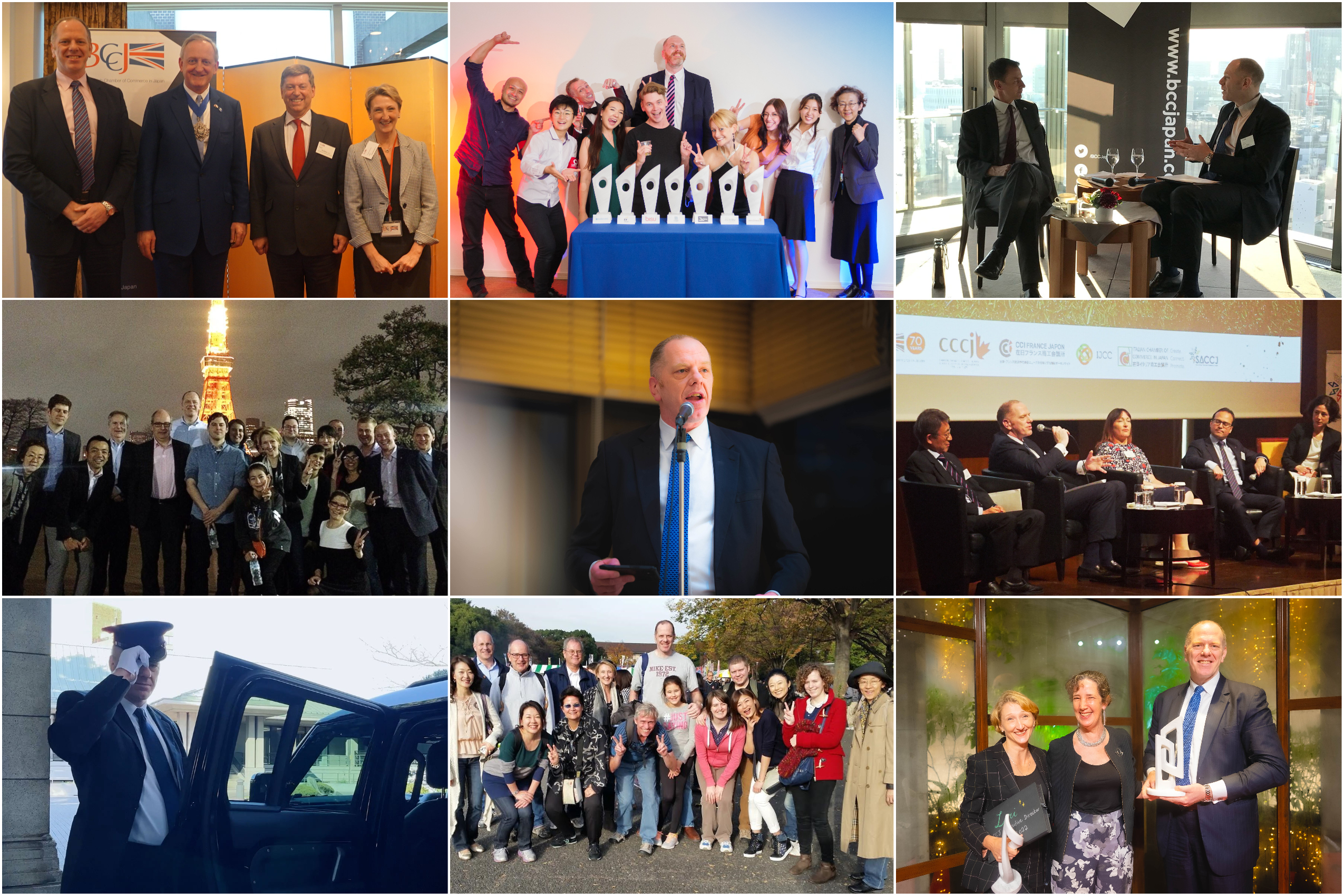
On Excom, you’ve got entrepreneurial leaders who started their own businesses and captains of industry who guide blue chip companies. It’s been a privilege to work closely with them all and to learn from their attitudes to people and business. The general membership, too, from the largest corporates to sole proprietorships, ask what they can do for the BCCJ, which is incredibly satisfying. It’s also been an honour and an education to collaborate with other organisations focused on the Japan–UK business relationship, including the Embassy, the British Council, Department for International Trade and the British Market Council.
What are your key learnings?
When I was first asked what I wanted to do as president of the BCCJ, I recall (to my shame) not being able to articulate a clear answer. Since then, being president has given me the opportunity to observe many talented leaders, and my biggest realisation is that leaders don’t need to have all the answers. Rather, it’s important to articulate purpose, and to establish goals. My role as president then was about setting a direction for the chamber, marshalling the capabilities of Excom to figure out the plan to get us there, and then clearing space for the office team to deliver.
I faced many situations where I lacked the expertise or information to make a decision, and the importance in such situations of asking quality questions is another takeaway. In fact, I think it’s one of the highest-level skills in business—something to strive for that can never be mastered. Great questions are keys to unlocking new information and understanding, and I will forever remain an ardent disciple of the ambition to listen more attentively and to ask better questions.
What might lie ahead for the BCCJ?
It’s an exciting time for UK–Japan business, with an ever-closer bilateral relationship. It’s great to see the cultural interaction between the two countries and, with borders reopened, we’ll hopefully see more travel in both directions. In the past couple of years, we’ve seen the bilateral economic partnership agreement concluded and there’s now excitement around the UK’s accession to the CPTPP [Comprehensive and Progressive Agreement for Trans-Pacific Partnership]. Going forward, therefore, there should be many more opportunities for the BCCJ to support UK–Japan business partnering and collaboration.
Historically, BCCJ activity has been very focused on Tokyo because our main offering was face-to-face events. The development of digital capability, however, has enabled us to broaden our offering and extend membership to a new range of people. We have an increasingly strong value proposition for people living outside Tokyo and overseas, and I think we will see greater engagement with a dispersed group of stakeholders beyond our core Tokyo-based constituents.
I hope the voice of the BCCJ will become more influential, too, through engagement on topics that are important to our membership and by leveraging the relationships of the chamber. And I also hope for greater promotion of Japan business links with Scotland, Wales, Northern Ireland and the regions of England. London features prominently in the UK–Japan business relationship and in the UK’s relationship with Tokyo (as recognised in the 2017 Memorandum of Understanding between the City of London Corporation and Tokyo Metropolitan Government). However, as someone born in Scotland with Welsh ancestry and raised in England, I identify strongly as British, and hope to see the BCCJ do more to promote the extraordinary capabilities of the UK’s national component parts.
What is your message to members?
I first talked about resilience at the 2015 BBA, suggesting it was something that England rugby fans needed after the country had just become the first host nation to fail to progress to the knockout rounds of its own Rugby World Cup tournament. Scotland and Wales had performed admirably (and England did indeed come good four years later in Japan!).
Over the last couple of years, under the shadow of COVID, we are frequently counselled about the need to become more resilient, but are rarely advised how. After some reflection though, my personal mantra is to “Go For Hot Chocolate.” Tongue-in-cheek, the beverage is of course a comforting pick-me-up, but I also find the mantra to be a mnemonic with potent prescriptive power: G.F.H.C.
G is for Goals (and their motivational importance), F is for Focus, H is for Hope, and C is for Coping (mechanisms). These are useful components of strategies to develop personal resilience. But how is it possible to become more hopeful? Author Catherine DeVrye suggests that H.O.P.E is in itself an elegant acronym, advising that to feel more hopeful we should: Help (others), Optimise (all opportunities), Persist (no matter what) and Empower (other people). In short, the way to become more hopeful is to focus less on ourselves and more on what we can do for others.
I’ve seen this behaviour frequently during my time at the BCCJ, where members and stakeholders contribute their time, talent and toil to the collective pursuit of BCCJ objectives. It’s the culture of our chamber, and I trust that members will continue to help each other in both challenging and cheerful times. Service to others lies at the heart of enhanced resilience, and by helping others we help ourselves. That’s a recipe I sincerely hope will nourish the BCCJ for many years to come.

